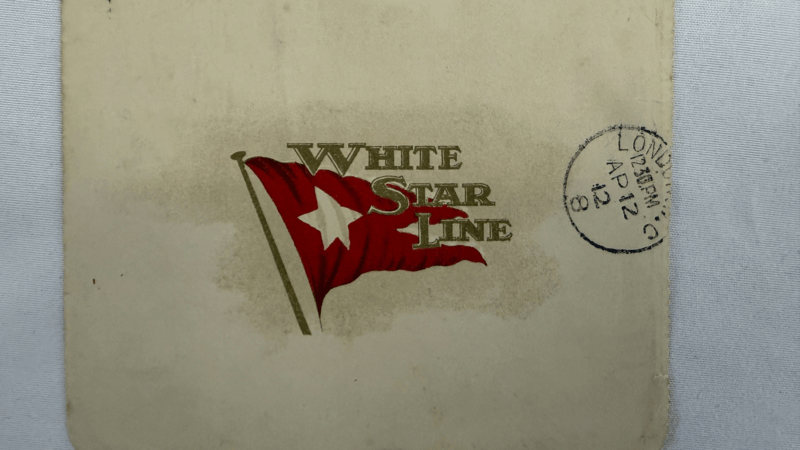‘Prophetic’ letter written by Titanic survivor sells for nearly $400,000 at auction
When first-class passenger Col. Archibald Gracie boarded the Titanic in Southampton, England, on April 10, 1912, he drafted a letter to a friend.
“It is a fine ship,” he wrote, “but I shall await my journey’s end before I pass judgment on her.”
Five days later, the “unsinkable” ship struck an iceberg and sank in the frigid waters off Newfoundland, killing some 1,500 of the vessel’s roughly 2,200 passengers.
Now, Gracie’s eerily prescient letter has sold at auction to an anonymous bidder for a record-breaking $399,000 — nearly five times its expected price. The auction took place on Saturday in Devizes, England.
Andrew Aldridge of Henry Aldridge & Son, the auction house that oversaw the sale of the letter, told NPR he believed the note was so highly prized largely because of Gracie’s “incredible” sentence about withholding judgment before the ship’s journey ended.
Aldridge, an auctioneer who specializes in the valuation of Titanic memorabilia, added that the sale was testament to the public’s continued interest in the famous shipwreck.
“The stories of those men, women and children are told through the memorabilia, and their memories are kept alive through those items,” Aldridge said in an email.
In 2013, the auction house also sold a violin believed to have been played by bandleader Wallace Hartley as the ship sank.
The instrument sold for over $1.6 million, setting a record for Titanic-related artifacts at the time.

Col. Archibald Gracie, a wealthy American real estate investor, managed to survive the sinking by climbing onto an overturned collapsible lifeboat with around a dozen other men, according to the auction house.
He went on to write The Truth About the Titanic, a personal account of how the disaster unfolded. According to Gracie, around half the men who reached the lifeboat died from exhaustion or extreme cold.
Despite surviving the tragedy, Gracie died less than eight months later due to health issues exacerbated by hypothermia and physical injuries sustained from the shipwreck, according to the auction house.
The letter left the ship when it made a stop in Queenstown, Ireland, before embarking across the Atlantic. The seller’s great-uncle was an acquaintance of Gracie’s, who received the letter at the Waldorf Hotel in London on April 12, 1912 — three days before the ship sank.
Buddhist monks head to DC to finish a ‘Walk for Peace’ that captivated millions
The group of Buddhist monks is set to reach Washington, D.C., on foot Tuesday. The monks in their saffron robes have become fixtures on social media, along with their rescue dog Aloka.
Trump is threatening to block a new bridge between Detroit and Canada from opening
President Donald Trump on Monday threatened to block the opening of a new Canadian-built bridge across the Detroit River, in his latest salvo over cross-border trade issues.
Ghislaine Maxwell appeals for clemency from Trump as she declines to answer questions
Maxwell declined to answer questions from House lawmakers on Monday, but indicated that if President Trump ended her sentence, she was willing to testify that neither he nor former President Clinton had done anything wrong in their connections with Epstein.
Lindsey Vonn says she suffered ‘complex tibia fracture’ in her Olympic downhill crash
The 41-year-old star said her torn ACL was not a factor in her crash. "While yesterday did not end the way I had hoped, and despite the intense physical pain it caused, I have no regrets," she wrote.
Guerilla Toss embrace the ‘weird’ on new album
On You're Weird Now, the band leans into difference with help from producer Stephen Malkmus.
Nancy Guthrie search enters its second week as a purported deadline looms
"This is very valuable to us, and we will pay," Savannah Guthrie said in a new video message, seeking to communicate with people who say they're holding her mother.





